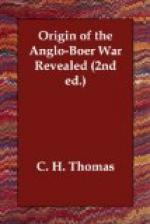In the earlier period of the Transvaal Republic, one year’s residence was first held sufficient for acquiring full franchise or burgher rights and voting qualifications. The condition was successively raised to two, three, and five years; but in 1890 laws were passed which required fourteen years’ probation, with conditions which virtually brought the term to twenty-one years, and even then left the acquisition of full franchise to the caprice of field-cornets and higher officials. Englishmen and their descendants were at one time totally and for ever excluded and disqualified just merely because of their nationality whilst Hollanders were admitted in very large numbers without having to pass any probation at all or only comparatively short terms. The English language became a target for hostility and as good as proscribed; impracticable and ludicrous attempts even were made to exclude its use in Johannesburg, where hardly any Uitlander understood Dutch, whilst every Boer official was well versed in English: market and auction sales were to be conducted only in Dutch; bills of fare at hotels and restaurants were also to be in full-fledged Dutch only—and all this, it must be remembered, some years before the Jameson incursion took place.
The judiciary, which, according to the “Grondwet” (Constitution), was the highest legal authority, was by one stroke of enactment rendered subservient and subordinate to the First Volksraad. The then Chief Justice (Kotzee) was ignominiously deposed for honourably contending against the grave departure from right and justice in subverting the sacred prerogative due to the highest tribunal, which Boer and Uitlander alike relied upon for independent justice.
A new system of education was next introduced which admitted only High Dutch as the medium of instruction in public schools. As only Hollander children could benefit by such tuition, and whereas those of other immigrants could not understand that language, the effect was that parents of English and other nationalities had to combine in establishing private schools or else to employ private teachers at their own expense—whilst paying, in the way of taxation, for Hollander public schools as well. That oppressive system was subsequently somewhat modified in a manner which admitted the English language as a medium for a portion of the school hours, the proportion so accorded being larger in Johannesburg and other such wholly English-speaking centres than in other parts of the State; but the amelioration did not take place until after much irritation and expense had been occasioned, nor did it meet the case of hardship more than half-way. I may here place the remark that the public educational department is conducted without stint of expenditure in providing from Holland the amplest and best school equipments and highly salaried Dutch professors and teachers.
Irritating class legislation began to be systematically resorted to, to the prejudice of Uitlanders (the majority of whom, it will be borne in mind, were English), which painfully pointed to a fixed determination on the part of the Boers to lord it over them as a totally inferior class, allowing them no representation, and to treat them, in fact, just as a conquered people placed under tribute and proper only to be dominated and exploited.




